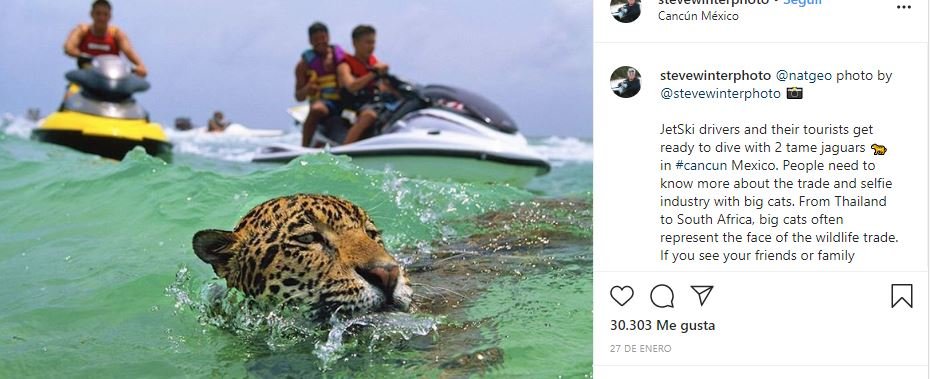El fotógrafo del National Geographic Steve Winter ha denunciado, a través de su cuenta de Instagram, la "explotación" a la que están sometidos algunos jaguares en Cancún, por parte de diferentes atracciones turísticas, donde acuden los turistas para fotografiarse con los felinos.
En este sentido, Winter criticó que los 'me gusta' tengan más peso que el bienestar de los animales salvajes y acusó a los agentes turísticos del destino mexicano de explotar a estos felinos a cambio de beneficiarse económicamente.
El fotógrafo publicó dos post en la red social denunciando este tipo de situaciones. En uno de ellos, se observa a un jaguar nadando y justo detrás a diferentes usuarios admirándolo, montados en motos de agua. En él, Winter aclara que los conductores de las motos de agua y los turistas "se preparan para bucear con dos jaguares mansos en Cancún, México".
A posteriori, manifestó que los grandes felinos suelen representar "la cara del comercio de la vida silvestre" y aseguró que este tipo de negocios, que implican animales salvajes, "están a menudo vinculados a programas de cría y comercio ilegal de cachorros".
En otra de las publicaciones, aparecen los dos jaguares encadenados a una barca, en el mismo destino azteca. "Las prácticas de explotación de la vida silvestre como esta son comunes en todo el mundo y es importante que estemos atentos a las operaciones turísticas dudosas, que promueven la venta de animales", redactó el fotógrafo.
"Puede parecer algo genial (fotografiarse con un tigre, leopardo o elefante), pero hay mucho dolor, trauma y abuso para que estos animales sean amigables con las personas. Los grandes felinos no evolucionan para ser 'amigos' de la gente, para ser acurrucados, acariciados y tocados", reflexionó en el mismo post.
Winter también comparte en su Instagram datos curiosos de diferentes felinos, mostrando así su pasión por estos animales salvajes para los que pide protección y, sobre todo, concienciación.














